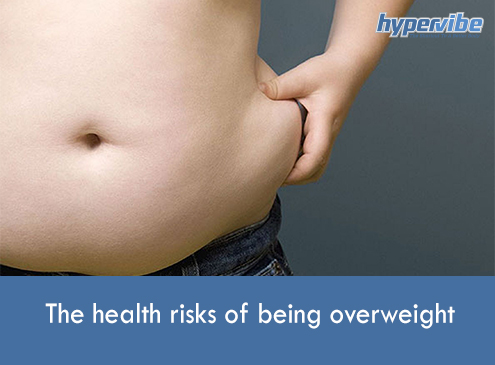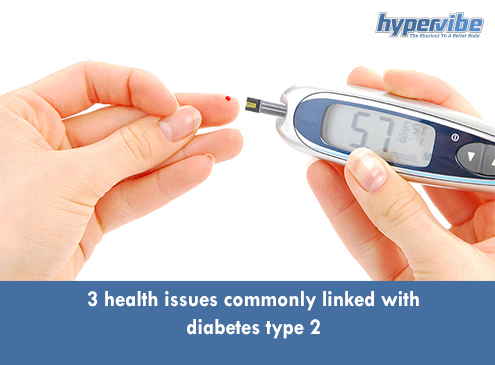The health risks of being overweight
Carrying many extra pounds is not only a problem of esthetics; the excess weight stored around your waist, on your belly or on your hips and buttocks can wreak havoc on your health, increasing your risk of developing ailments like diabetes, heart disease, gallstones, depression, gout, stroke or even certain cancers.
One is considered overweight when their body fat percentage is between 25-30% in women and 18-23% in men. When these percentages reach 30% body fat in women, respectively 25% body fat in men, the individuals are considered obese.
Given below are some of the most serious health issues linked with obesity.
1. Being overweight increases the risk for coronary heart disease
Coronary heart disease is a condition in which plaque builds up inside the blood vessels, blocking the arteries and impairing the blood and oxygen supply to the heart. The waxy substance doesn’t accumulate overnight, but in time, as a result of poor diet habits and lack of physical activity.
When the arteries become blocked or narrowed, the blood flow to the heart muscle is reduced and this can cause chest pain, discomfort or even a heart attack. In severe cases, obesity can lead to heart failure, when the heart is no longer able to pump as much blood as the organism needs for performing all its functions.
2. Carrying excess weight increases blood pressure and risk of stroke
Besides increasing the risk for heart disease, being overweight also makes you more likely to develop high blood pressure, as the cardiac muscle has to work harder to supply enough blood for all tissues and organs. Blood pressure is measured as the force of blood pushing against the blood vessels’ walls as the heart pumps the fluid.
In a healthy organism, the blood pressure value should be around 120/80 mm Hg or less, the first number being the systolic blood pressure and the second one the diastolic blood pressure. One has hypertension if their blood pressure value is consistently higher than 140/90. Having high blood pressure doesn’t always cause visible symptoms, except for a faster heart rate, but in time this condition can lead to heart disease, kidney failure and stroke.
Another consequence of excess weight is an increased risk of stroke. Stroke happens when the blood supply to a part of the brain stops, causing the nervous cells to die. The most common cause of stroke is the blockage of an artery caused by a blood clot, but stroke can also happen when a blood vessel inside the brain gets damage and bursts. Obesity and high blood pressure increase the risk of stroke, while losing the excess weight can help in reducing this risk.
3. Obesity is a leading cause of type 2 diabetes
According to researchers at Harvard, being obese increases the risk of diabetes 20 times. Type 2 diabetes appears when the organism can’t use glucose in an efficient manner, and sugar remains in the blood stream for too long, and in too high levels.
This happens because the organism becomes resistant to insulin, the hormone that transports sugar from blood to all cells, for energy production. In people who are insulin resistant, cells cannot taken in enough sugar for stabilizing the blood glucose levels, so the cells that produce insulin must work harder to keep blood sugar levels under control.
Losing weight and practicing physical activities to burn the extra sugar can help in stabilizing blood glucose levels and in decreasing the risk of diabetes type 2 in obese people.
4. Excess pounds increase the risk of kidney disease
The kidneys are responsible for removing excess water from the body, and for flushing out toxins and debris. At the same time, they help in keeping blood pressure under control. When the kidneys are damaged and can’t filter the blood properly, waste can build up inside the body, and the blood pressure inside these organs can increase, favoring the occurrence of kidney disease.
5. Obesity is linked with high LDL cholesterol and metabolic syndrome
People who are overweight or obese are more likely to have high levels of bad cholesterol and triglycerides. High cholesterol is a risk factor for heart disease, and is caused by an inadequate diet, that is too high in saturated and trans fats. Losing weight can help in lowering your bad cholesterol levels and can reduce the risk of developing metabolic syndrome.
This condition is in fact a collection of factors that, when combined, increase the risk of developing diabetes type 2 and heart disease. Metabolic syndrome manifests through a lot of belly fat and a large waist circumference, high blood sugar levels (100 mg/dL or higher) , high levels of blood fats (150 mg/dL or higher), low levels of good cholesterol (under 40 mg/dL for men and 50 mg/dL for women) correlated with high levels of LDL cholesterol, as well as high blood pressure (130/85 mm Hg and higher).
6. Being overweight increases the risk of fatty liver disease
Fatty liver disease or nonalcoholic steatohepatitis (NASH) occurs when fat cells accumulate inside the liver, impairing its functioning. This may lead to liver damage, the formation of scar tissue and even liver failure. The exact cause of this condition is unknown, but studies have shown that people who are overweight are more likely to develop this ailment.
Have something to add to this article? Comment below or join our Facebook community and share your thoughts with us!















